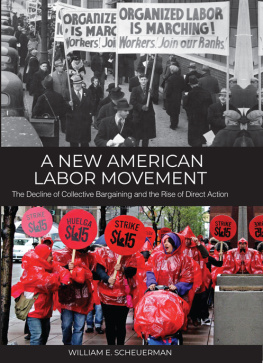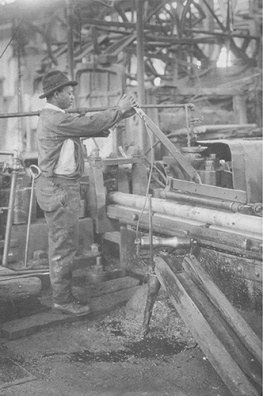Debonair and carefully attired, Labadie belied the stereotype of an anarchist. (Authors photo.)
All-American
ANARCHIST
J OSEPH A. L ABADIE
and the Labor Movement
Carlotta R. Anderson
G REAT L AKES B OOKS
P HILIP P. M ASON
Editor
Department of History, Wayne State University
D R . C HARLES K. H YDE
Associate Editor
Department of History, Wayne State University
Copyright 1998 by Wayne State University Press, Detroit, Michigan 48201.
All material in this work, except as identified below, is licensed under a Creative Commons Attribution-NonCommercial 3.0 United States License. To view a copy of this license, visit https://creativecommons.org/licenses/by-nc/3.0/us/.
All material not licensed under a Creative Commons license is all rights reserved. Permission must be obtained from the copyright owner to use this material.
The publication of this volume in a freely accessible digital format has been made possible by a major grant from the National Endowment for the Humanities and the Mellon Foundation through their Humanities Open Book Program.
Library of Congress Cataloging-in-Publication Data
Anderson, Carlotta R., 1929
All-American anarchist: Joseph A. Labadie and the labor movement / Carlotta R. Anderson.
p. cm.(Great Lakes books)
Includes bibliographical references and index.
ISBN 978-0-8143-4326-5 (alk. paper); 978-0-8143-4327-2 (ebook)
1. Labadie, Jo, 18501933. 2. AnarchistsUnited StatesBiography. 3. Labor movementMichiganHistory. I. Title. II. Series.
HX843.7.L33A53 1998
335.83092dc21
Cover photo: Jo Labadie, 1905. (Authors photo.)
Wayne State University Press thanks the following institutions for their generous permission to reprint material in this book: Astor, Lenox, and Tilden Foundations at The New York Public Library; Catholic University of America Departments of Archives and Manuscripts; Houghton Library at Harvard University; University of Michigan Library (Joseph A. Labadie Collection); and The Wisconsin Historical Society.
http://wsupress.wayne.edu/
To the memory of my mother,
C HARLOTTE A NTOINETTE L ABADIE H AUSER ,
who adored her father
and inherited the gentle part of his nature.
A CKNOWLEDGMENTS
The genesis of this book came from Edward C. Weber, curator of the Labadie Collection which I first visited in 1984 when my daughter was a student at the University of Michigan. He suggested I write the biography of my grandfather after reading an article of mine about grand juries. In the years since, he has been an unfailing source of encouragement and assistance as well as a personal friend. I am also indebted to librarians Kathryn Beam, Julie Herrada, and Anne Okey of the Universitys Special Collections Library for their painstaking professional help in locating and obtaining source materials for me. Dione Miles, former reference librarian in the Walter P. Reuther Library of Wayne State University, extended her friendship along with archival assistance. Many other librarians have been most helpful.
It was particularly gratifying to me to receive the support of Paul Avrich throughout the long process of completing the book. He read portions of the manuscript and was always confident that I would finish it and that it would be published. Other scholars who encouraged me, made useful suggestions, pointed me to relevant sources, or gave me articles or manuscripts include Frank Brooks, Randall Donaldson, Sidney Fine, the late Herbert G. Gutman, the late Stuart B. Kaufman, Leonard Liggio, and Richard Jules Oestreicher. James J. Martin, one of Laurance Labadies few close friends, also offered assistance in the disposition of the books and literary effects of Jo and Laurance remaining in the latters possession at his death in 1975.
I would like to thank Mark A. Sullivan, a young man who admired and befriended Laurance in his last lonely years. It was he, assisted by Sharon Presley, who knowledgeably sorted through the daunting mass of materials Laurance had stashed away, shipping most to the Labadie Collection but saving for me Jo Labadies scrapbooks, his personal account book, and hundred of photographs, all enormously valuable in researching this book. He also gave me useful counsel and insights into anarchist philosophy.
I had the benefit of extensive research, genealogical and otherwise, undertaken by Larry Emery, the grandson of Jos brother, Oliver, as well as Brother Albert Labadie, editor of Labadies Family Newsletter. I received newspaper clippings, photographs, and recollections from distant relatives Emmett, Austin, and Elizabeth Labadie, and from Siphra Rolland.
I owe immense gratitude to my husband, Jim, daughter, Julia, and dear friend George Shermaneditors and journalists allwho spent many hours reading the entire manuscript, giving me invaluable advice. My sons, Chris and Eric, affectionately prodded and encouraged me as the years passed, and I appreciate it.
P REFACE
Some lives are notable because they changed the course of the world. Others played a more subtle role in the movements they helped inspire and form. Reading about these figures, we experience the events of the past in fuller detail and can often identify more vividly than with the stories of the great heroes and villains. Such a man was Joseph A. Labadie.
A Michigan anarchist and labor leader, Labadie (pronounced La- badie and known as Jo most of his adult life) was neither hero nor villain, but he had his day on the stage during one of the most turbulent and formative periods of American society. When he was born in the village of Paw Paw in 1850, the nation was wrenching itself from a rural, craft-oriented economy to one that was increasingly mechanized and depersonalized. As he came to maturity, revolutionary fervor stirred the worlds impoverished workers as they watched the new capitalists flaunt gilded lives. Emile Zola described the time and the new social forces being born: Men were springing up, a black avenging host was slowly germinating in the furrows, thrusting upwards for the harvests of the future ages. And very soon their germination would crack the earth asunder.
Jo Labadie, a born rebel, was one of the countrys most zealous in leading the fight for workers rights and social justice. By the late nineteenth century, he had become Michigans most influential labor agitator. Through him, the underdogs began to snarl back with a vengeance. Labor was fragmented and at the mercy of employers. Many labor leaders and workers were determined to seek power through solidarity. Labadie immersed himself in countless efforts to revolutionize society. As one memorialist quipped, Jo was a man who could see something good in every movement that was opposed to the present system.














